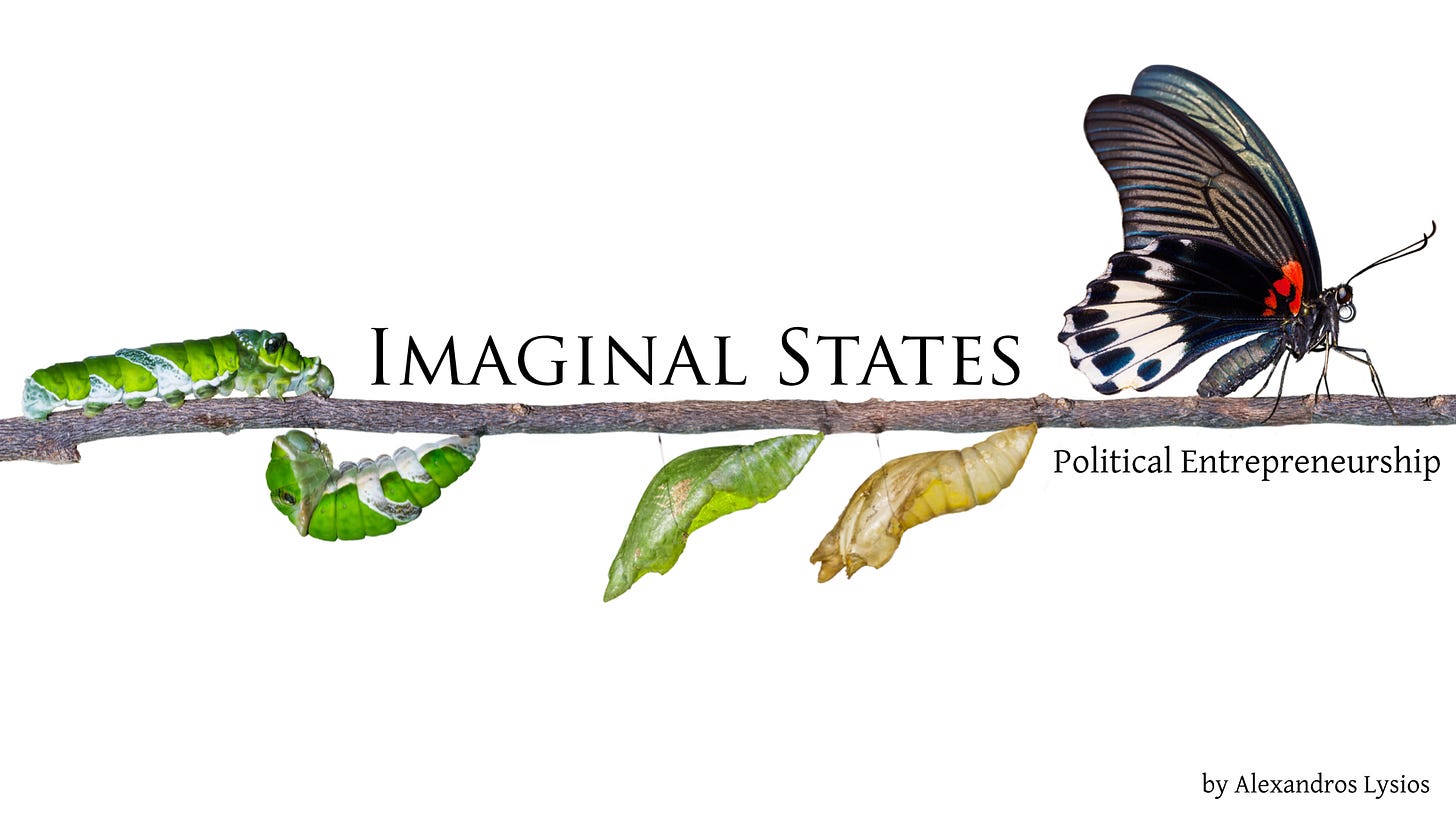The framework of Imaginal States provides a way for new states to be born with consent rather than violence, spaces where social contracts can be renegotiated, and populations can re-naturalize through a citizenship market where states compete to offer the best quality of life and governance. It is a way to transform citizenship from an accident of birth to a free choice based on affinities of value.
About four years ago, I gave a talk on themes worked through Philosophical Fight Clubs I organized throughout Europe at the time. The setting was the BIL unconference, an event dear to my heart that I’ve participated and given talks in many times, including its inaugural instance in Monterey back in 2007. I remember debating in my mind as to the title I would put on the whiteboard. The first option was Political Entrepreneurship. But then I thought, especially given there were multiple concurrent talks taking place, that something catchier would draw more people, so I opted for On the Freedom to Start Your Own Country:
The conceptual framework behind Imaginal States is a continuation of the ideas from that talk in 2008 that comes as an alternative and response to the many bold efforts and conjectures related to what I believe is a more general space that could be appropriately filed under a heading that happened to be the alternative title of my talk: political entrepreneurship. This is why it also features as the subtitle to my Imaginal States short presentation that you can download at the end of this post.
Because whether you’re talking about Seasteading, Charter Cities, or a Network State, the underlying theme is the spirit of entrepreneurship as applied to politics and governance, resulting in alternative ways of living.
Nowadays more and more people are becoming convinced that contemporary governments have become victims of different degrees of regulatory capture. The paths through which our voices turn into legislation have become hijacked to the point their function appears to prevent rather than enable change, exasperating those who try to use them to bring about social change to the point of exhaustion, serving more like political window dressing, hindering our ability to change fast enough in response to ever complex conditions thereby increasing the probability of social collapse1.
Meanwhile, new powerful methods of controlling media exposure and curated consumption in echo chambers developed or enabled by social media and search giants, like Google and Facebook, affect the so-called Overton window, especially when coupled with active censorship by collaboration between governments and social media companies2. When you add to it the rise of total surveillance states3 and their marriage with capitalism4 with advances in research related to behavior change5, all being leveraged by the status quo to manipulate the contents of our voices and gaslight us as to what they ought to be, these developments, along with a host of other social justice issues, are generating enough disillusionment that the inner scales among an increasingly larger set of citizens around the world are tipping towards exit rather than voice. I do not see this trend abating.
It is time to call it: the social contract is broken, the Republic, Lost.
Unprecedented technological unemployment6 and socio-economic inequality7, mass migrations that will happen due to climate change8, global ecosystem collapse9, rainwater everywhere on Earth becoming unsafe to drink10, noticeable worldwide inflation11, disrupted supply chains12, younger generations being the most disillusioned in living memory13, a crisis in our social imaginary14, all combined with the betrayed promises of the legacy nation states15…what we’re witnessing is a version of systemic collapse in real time that is bound to generate significant social upheavals and inevitable re-organizations in the way we live.
Rather than defending a global system that has brought us to this point, the framework of Imaginal States is akin to a bold conjecture on how to start over, giving us a chance to reconfigure the sociopolitical units we want to be a part of in order to deal with the complex set of existential global challenges we have to face.
That’s the whole premise behind Tainter’s The Collapse of Complex Societies.
See for example White House ‘flagging’ posts for Facebook to censor over COVID ‘misinformation’, New York Post. Or the recent revelations related to Twitter and the Twitter Files as detailed in this article: Why the Twitter Files Are in Fact a Big Deal (Jacobin) and this one: How Twitter Rigged the Covid Debate (The Free Press).
See for example this article on China’s social credit system by Wired.
See Wikipedia entry on Surveillance Capitalism.
There’s literally an entire lab in Stanford dedicated to this.
A relatively recent UN report estimates that robots will replace two-thirds of all workers in the developing world. The latest advances in Artificial Intelligence (see Midjourney, DALL·E 2) show that skilled workers in the developed world across multiple industries, that were thought to be unassailable by technological advances because they dealt with artistic creativity, will probably result in technological unemployment of inestimable size too.
See this paper, as an example of income inequality in America, or this article by Oxfam about global inequality, which bluntly states that the 8 richest people in the world own as much as half the world.
See this report by the World Bank Blogs.
See this article by Pew Research Center.
See Why supply-chain problems aren’t going away by the Economist.
See The Crisis of the Social Imaginary and Beyond by Bojana Cvejic and Ana Vujanović.
You can find two examples of that here: the first documents it for the United States, and the second for South Africa.





